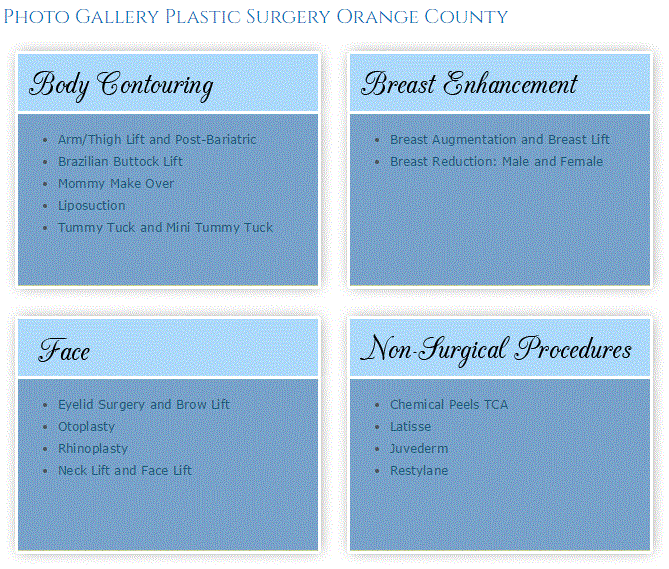There was a time when if you had a health concern, you would make an appointment and “ask the doctor.” Your doctor was a kindly, unassuming figure dangling a stethoscope and wielding a cylindrical little rocket that he inserted in your ears. Then he shoved the tongue depressor down your throat, made you say, “Ahhh…” and declared “Nothing that a few days rest won’t take care of.” But that was then.
Today, when something’s wrong you fortify yourself with a snack and hunker down in the glow of the Internet, indulging in uncertainty, conjecture and self-diagnosis only to emerge hours later with a headache and the name of a specialist. He (or she) will not only peer down your throat but also order a battery of diagnostic tests. Two weeks later, when results are in, you return to the specialist who will probably tell you, “You need a couple of days of rest.”
Cosmetic surgery is a specialty apart from all others. Endoscopy, colonoscopy and appendectomy are not advertised as life changing procedures, but plastic surgery is. There’s a constant barrage of Internet, TV and print ads that suggest you will enhance your life if you sculpt, enhance, whittle and lift your various body parts. Ads offer plastic surgery vacations, bargain basement liposuction, noninvasive miracle procedures, Botox parties and the do-it-yourself Botox kit.
On the other hand, the press bombards you with plastic surgery horror stories. Recent plastic surgery headlines involve a breast implant scandal in Europe involving unsafe implant materials, reports of butt augmentations gone wrong and stories about unqualified practitioners practicing in less than hygienic surroundings.
Once you make the decision to undergo a cosmetic procedure, you can’t simply go to your neighborhood surgeon (those days are gone), but there’s no reason to get overwhelmed with advertising or plastic surgery in the media.
Plastic Surgery 101 The only way to deal with plastic surgery advertising is to be a safe and educated consumer. An educated consumer is not vulnerable to charlatans, false advertising and unrealistic promises.
Here is the most important plastic surgery advice: Your cosmetic procedure must be performed by a licensed physician with proper credentials operating in an accredited facility. Do not get stuck on the Internet pursuing plastic surgery offers. Instead, seek out a professional organization for information and referrals. ASAPS is one such organization; their mission is “educate the public that in the right hands, in the right setting, and on the right patient, cosmetic surgery can have profound physical and psychosocial benefits.”
The right hands If you’re confused about finding a plastic surgeon, you’ve got good reason. Anybody can claim to be a doctor, cosmetic surgeon or plastic surgeon. Your first priority is to check a physician’s credentials to see that his training and certification is appropriate for the procedure you want. Dr. Kalantarian is a Board Certified Plastic Surgeon & ASAPS member. Certification by The American Board of Plastic Surgery (ABPS) ensures in-depth surgical training in all aspects of plastic surgery. U.S. or Canadian membership in The American Society for Aesthetic Plastic Surgery (ASAPS) means a surgeon is ABPS-certified and has met additional requirements for continuing education and experience in cosmetic surgery.

The right setting Accredited office-based facilities have a safety record comparable to hospital ambulatory surgery settings. If you select a board-certified plastic surgeon from the ASAPS database “Find-a-Surgeon,” you can be sure that the member-surgeons use accredited office-based surgical facilities. Otherwise, ask these questions to make sure your office-based cosmetic surgery is performed in a setting that is safe:
- Is the office-based surgical facility accredited by a nationally or state recognized accrediting agency, or is it state licensed or Medicare certified? Nationally recognized accrediting agencies include the American Society for Accreditation of Ambulatory Surgery Facilities (AAAASF), the Joint Commission on Accreditation of Healthcare Organizations (JCAHO), and the Accreditation Association for Ambulatory Health Care (AAAHC).
- Does your surgeon have privileges at an accredited acute care hospital for the specific procedure you are undergoing?
- If your procedure involves sedation, will it be monitored by registered nursing personnel? If general anesthesia is used it must be administered by a board-certified anesthesiologist or certified registered nurse anesthetist.
- Are the emergency equipment and anesthesia monitoring devices in the surgical facility equivalent to those that would be necessary for the same surgical procedure performed in a hospital or freestanding ambulatory surgery center?
- Are provisions made for hospital admission in the event of unforeseen complications?There should be a separate recovery area with monitoring equipment equal to that required by a hospital or ambulatory surgery facility.
- Will there be a doctor and a registered nurse at the site until you are recovered?
- Will the surgeon determine when you are discharged?
The right patient If you suffer from obesity and consult with a plastic surgeon about liposuction as a way of removing excess pounds and giving you the body you dream of, a good plastic surgeon will tell you to go home and go on a diet. Similarly, if your face is weathered and heavily lined from years of sun exposure and you think a little Botox is your answer the right surgeon will suggest a more realistic treatment. Even more important, the right doctor will not operate on you unless he gets medical clearance from your internist, heart doctor or anyone else who is treating you for a serious medical condition. Simply, as consumers, we are not always the best judges of whether or not we are the “right patient” for a procedure. Remember, you need to be in the right hands in a safe setting, but you also need to be a good candidate for the procedure you’re undergoing. Your first step is consultation with a board-certified practitioner.
Good weather never makes top headlines and neither does good plastic surgery. Good plastic surgery is a specialty that rarely gets notice because it is not very noticeable. And that ideal, pursued in a safe setting, is what you’re seeking.
